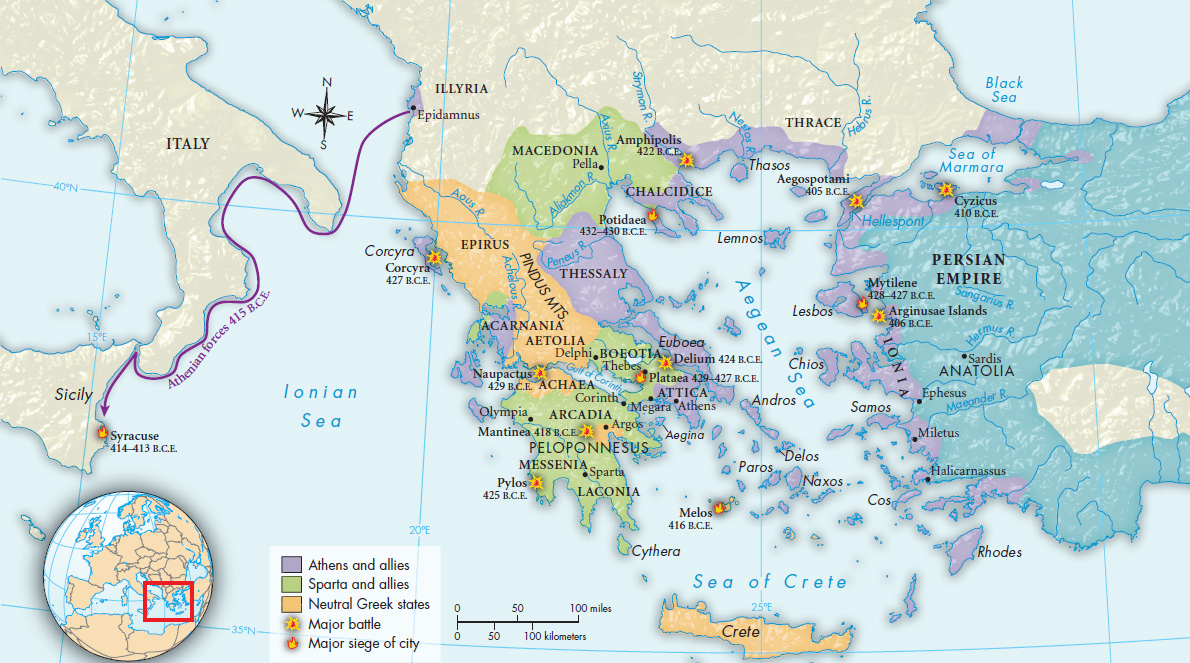A History of Western Society: Printed Page 74
A History of Western Society, Value Edition: Printed Page 79
The Peloponnesian War
At the outbreak of the war, which became known as the Peloponnesian (puh-luh-puh-NEE-zhuhn) War, the Spartan ambassador Melesippus warned the Athenians: “This day will be the beginning of great evil for the Greeks.” Few men have ever prophesied more accurately. The Peloponnesian War lasted a generation and brought in its wake disease, famine, civil wars, widespread destruction, and huge loss of life (Map 3.3). During the first Spartan invasion of Attica, which began in 431 B.C.E., cramped conditions within the walls of Athens nurtured a dreadful plague that killed huge numbers, eventually claiming Pericles himself. (See “Primary Source 3.2: Thucydides on the Great Plague at Athens.”) The death of Pericles opened the door to a new breed of politicians, men who were rash, ambitious, and more dedicated to themselves than to Athens. Under the non-aristocratic Cleon, the Athenians counterattacked and defeated the Spartans, though Cleon was killed. Recognizing that ten years of war had resulted only in death, destruction, and stalemate, Sparta and Athens concluded the Peace of Nicias (NIH-shee-uhs) in 421 B.C.E.

MAPPING THE PAST
ANALYZING THE MAP How would you compare the area controlled by Sparta and its allies to that of Athens and its allies? How would you expect these similarities and/or differences to affect the way that each side chose to conduct its military campaigns?
CONNECTIONS What does the location of the major battles and sieges suggest about the impact of the war throughout Greece?
The Peace of Nicias resulted in a cold war. But even cold war can bring horror and misery. Such was the case when in 416 B.C.E. the Athenians sent a fleet to the largely neutral island of Melos with an ultimatum: the Melians could surrender or perish. The Melians resisted. The Athenians conquered them, killed the men of military age, and sold the women and children into slavery.
The cold war grew hotter, thanks to the ambitions of Alcibiades (al-suh-BIGH-uh-dees) (ca. 450–404 B.C.E.), an aristocrat, a kinsman of Pericles, and a student of the philosopher Socrates (see page 87). A shameless opportunist, Alcibiades widened the war to further his own career and increase the power of Athens. He convinced the Athenians to attack Syracuse, the leading polis in Sicily, which would cut off the grain supply from Sicily to Sparta and its allies, allowing Athens to end the war and become the greatest power in Greece. The undertaking was vast, requiring an enormous fleet and thousands of sailors and soldiers, and ended in disaster. The Athenian historian Thucydides (thoo-SIHD-ih-dees) (ca. 460–ca. 399 B.C.E.), who saw action in the war himself and later tried to understand its causes, wrote the epitaph for the Athenians: “infantry, fleet, and everything else were utterly destroyed, and out of many few returned home.”5
The disaster in Sicily ushered in the final phase of the war, which was marked by three major developments: the renewal of war between Athens and Sparta, Persia’s intervention in the war, and the revolt of many Athenian subjects. The year 413 B.C.E. saw Sparta’s declaration of war against Athens and widespread revolt within the Athenian Empire, both supported by Alcibiades, who had defected to Sparta. The Persians threw their support behind Sparta and built a fleet of ships for them; in exchange they expected Ionia to be returned to them once the Spartans were successful. Now equipped with a fleet, the Spartans challenged the Athenians in the Aegean, and a long series of inconclusive naval battles followed.
The strain of war prompted the Athenians in 411 B.C.E. to recall Alcibiades from exile. He cheerfully double-crossed the Spartans and Persians, but even he could not restore Athenian fortunes. In 405 B.C.E. Spartan forces destroyed the last Athenian fleet at the Battle of Aegospotami, after which the Spartans blockaded Athens until it was starved into submission. In 404 B.C.E., after twenty-seven years of fighting, the Peloponnesian War was over, and the evils prophesied by the Spartan ambassador Melesippus in 431 B.C.E. had come true.